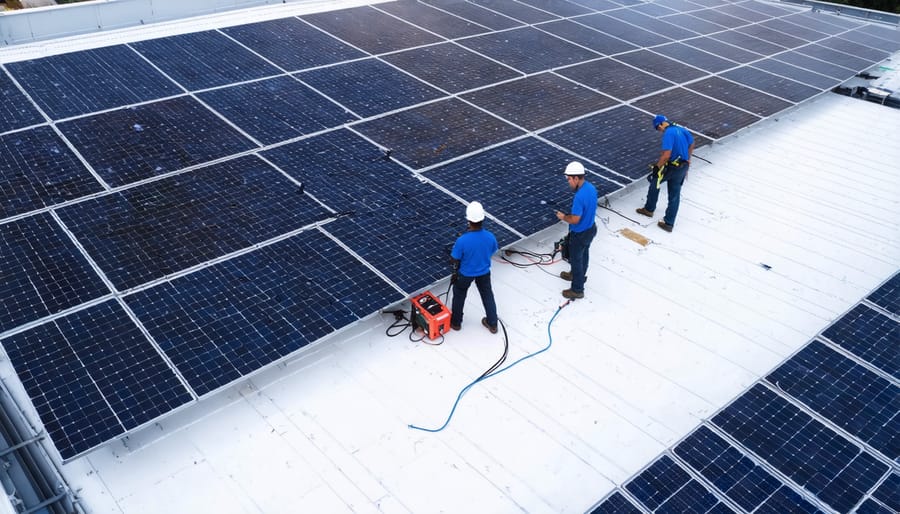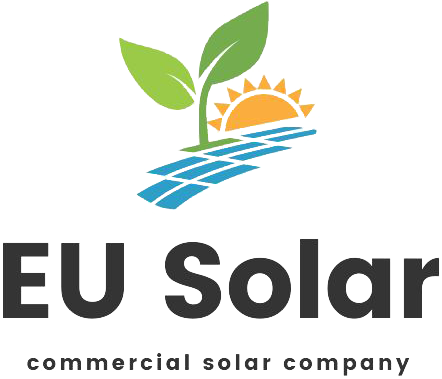The renewable energy sector presents unprecedented business opportunities as global investment in clean energy surpasses $1.7 trillion annually. From solar installation services to wind farm development, entrepreneurs are capitalizing on renewable energy career opportunities across multiple market segments. Leading venture capital firms have increased their clean energy portfolios by 40% since 2020, with particular focus on energy storage, smart grid technologies, and sustainable transportation solutions.
For business leaders and investors, three key market entry points offer compelling returns:
1. Direct Services: Installation, maintenance, and consulting services for residential and commercial renewable energy systems
2. Technology Development: Innovation in energy storage, grid management, and efficiency optimization
3. Project Development: Large-scale renewable infrastructure projects, including utility-grade solar farms and offshore wind installations
The renewable energy market is projected to reach $2.15 trillion by 2025, driven by decreasing technology costs, supportive government policies, and increasing corporate sustainability commitments. This transformation presents immediate opportunities for businesses of all sizes to participate in the clean energy revolution while generating substantial returns on investment.
Solar Energy Installation and Consulting
Commercial Installation Services
Commercial solar installation services represent a significant business opportunity in the renewable energy sector, with growing demand from businesses, industrial facilities, and institutional clients. Success in this field requires proper solar installation certification and a comprehensive understanding of commercial-scale solar systems.
To establish a commercial installation business, companies need to invest in skilled personnel, specialized equipment, and maintain necessary licenses and insurance coverage. Initial capital requirements typically range from $50,000 to $250,000, depending on the scale of operations and market location.
Key success factors include developing relationships with equipment suppliers, maintaining a skilled workforce, and building a strong project portfolio. Many successful companies start with small commercial projects (50-200kW systems) before scaling to larger installations.
The business model typically involves:
– Site assessment and system design
– Procurement of equipment and materials
– Installation and commissioning
– Project management and coordination
– Post-installation maintenance services
Revenue streams can be diversified through ongoing maintenance contracts, monitoring services, and performance guarantees. Current market trends show particularly strong growth in the commercial and industrial (C&I) sector, with many businesses seeking to reduce operating costs and meet sustainability goals through solar adoption.
For example, a mid-sized commercial installation business can expect to complete 15-20 projects annually, with average project values ranging from $100,000 to $500,000, representing significant revenue potential for well-executed operations.

Energy Consulting and System Design
Energy consulting and system design represents a lucrative opportunity in the renewable energy sector, particularly for professionals with technical expertise in solar power systems. This business model involves providing specialized advisory services to clients seeking to implement renewable energy solutions, with a focus on optimization and cost-effectiveness.
Consultants in this field typically offer comprehensive services including site assessments, energy consumption analysis, system sizing calculations, and ROI projections. They work closely with facility managers and property owners to develop customized solar solutions that maximize energy production while minimizing installation and operational costs.
For example, a consulting firm might help a manufacturing facility reduce its energy expenses by 40% through strategic solar panel placement and smart inverter selection. This involves detailed shade analysis, roof structural assessments, and electrical system integration planning.
Key service offerings often include:
– Feasibility studies and site evaluations
– Technical system design and specifications
– Equipment selection and vendor recommendations
– Permit application assistance
– Performance monitoring plans
– Financial modeling and incentive analysis
Success in this field requires staying current with evolving technologies, regulations, and incentive programs. Many consultants partner with installation companies and equipment suppliers to provide end-to-end solutions for their clients.
The market for energy consulting continues to grow as businesses and organizations increasingly prioritize sustainability and energy cost reduction. Consultants can establish recurring revenue streams through ongoing monitoring and optimization services, creating sustainable business models with high client retention rates.
Energy Storage Solutions
Battery Technology Distribution
The rapidly growing demand for energy storage solutions presents a significant business opportunity in battery technology distribution. As renewable energy adoption increases, the market for reliable storage systems continues to expand across residential, commercial, and industrial sectors.
Distributors can focus on various battery technologies, including lithium-ion, flow batteries, and emerging solid-state solutions. The most promising market segments include solar-plus-storage systems for homes, backup power solutions for businesses, and large-scale energy storage for utilities and industrial facilities.
Success in this sector requires establishing strong relationships with manufacturers, maintaining efficient supply chains, and providing comprehensive customer support. Distributors should offer value-added services such as system design consultation, installation coordination, and after-sales maintenance support to differentiate themselves in the market.
Key growth opportunities include:
– Partnering with solar installers and electrical contractors
– Offering turnkey storage solutions for specific industries
– Providing energy management systems integration
– Developing specialized financing options for customers
– Creating battery recycling and replacement programs
To maximize market potential, distributors should focus on regions with strong renewable energy incentives and high electricity costs. Additionally, staying current with technological advancements and regulatory requirements is essential for long-term success in this dynamic market.

Smart Energy Management Systems
Smart energy management systems represent a rapidly growing sector within the renewable energy industry, offering significant business opportunities for entrepreneurs and technology providers. These systems combine advanced software, IoT sensors, and artificial intelligence to optimize energy consumption and reduce operational costs for commercial and industrial facilities.
The market demand for intelligent energy solutions continues to surge as businesses seek to improve their energy efficiency and meet sustainability goals. Companies can capitalize on this trend by developing or implementing comprehensive energy management platforms that provide real-time monitoring, predictive maintenance, and automated control systems.
Key business opportunities include developing specialized software solutions, providing installation and maintenance services, and offering consulting services to help organizations optimize their energy usage. Professionals with digital energy management skills are particularly well-positioned to succeed in this market.
The integration of smart energy management systems typically delivers ROI within 2-3 years through reduced energy consumption, lower maintenance costs, and improved operational efficiency. For example, a recent implementation at a manufacturing facility resulted in a 30% reduction in energy costs and significantly decreased downtime through predictive maintenance capabilities.
As buildings become increasingly connected and automated, the demand for smart energy management solutions continues to grow, creating sustainable business opportunities across various market segments.
Maintenance and Support Services
The maintenance and support services sector represents a significant and growing segment of the renewable energy industry, offering steady revenue streams and long-term business opportunities. As renewable energy installations continue to expand, the demand for qualified maintenance professionals and technical support services has surged, creating a robust market for specialized service providers.
Companies entering this space can focus on preventive maintenance, performance monitoring, emergency repairs, and system optimization for various renewable energy installations. Solar panel cleaning services, wind turbine maintenance, and biomass system servicing are particularly lucrative areas. These services require specific technical expertise and adherence to maintenance certification requirements, making them valuable specialized offerings.
Remote monitoring and predictive maintenance services represent an emerging opportunity, utilizing IoT sensors and data analytics to predict and prevent system failures. This tech-enabled approach allows businesses to offer premium service packages with guaranteed uptime and performance optimization.
Equipment calibration, safety inspections, and compliance monitoring services are essential components of maintenance contracts, especially for large-scale installations. These services ensure optimal system performance while meeting regulatory requirements, creating recurring revenue opportunities through annual service agreements.
For entrepreneurs entering this sector, key success factors include:
– Building a skilled technical team
– Investing in diagnostic equipment and tools
– Developing strong relationships with equipment manufacturers
– Implementing efficient scheduling and dispatch systems
– Offering 24/7 emergency support services
The maintenance sector also presents opportunities for software development and management platforms that help track maintenance schedules, monitor system performance, and generate detailed reports for clients. These digital solutions can be packaged with traditional maintenance services to create comprehensive service offerings that provide additional value to clients while increasing revenue potential.
Green Energy Project Development
Site Assessment and Planning
Site assessment and planning services represent a critical entry point into the renewable energy sector, offering substantial business opportunities for professionals with expertise in environmental analysis and project development. This specialized service involves evaluating potential locations for renewable energy installations, conducting feasibility studies, and developing comprehensive implementation strategies.
Key business opportunities in this segment include providing environmental impact assessments, conducting geological surveys for geothermal projects, performing wind resource assessments, and analyzing solar irradiance patterns. Successful firms typically offer a combination of technical analysis and regulatory compliance services, helping clients navigate complex permitting processes and local energy regulations.
The growing demand for renewable energy installations has created a need for specialized consultants who can provide detailed site optimization studies, grid integration analyses, and financial modeling services. These consultants work with property owners, developers, and utilities to maximize project efficiency and return on investment.
Technology integration has become increasingly important, with opportunities emerging in drone-based site surveying, 3D modeling, and advanced data analytics. Companies that combine traditional assessment methods with innovative technologies often gain a competitive advantage in the market.
For entrepreneurs entering this space, initial investments typically focus on acquiring necessary certification, specialized software tools, and monitoring equipment. Strategic partnerships with engineering firms, environmental consultants, and equipment manufacturers can help establish credibility and expand service offerings.

Project Management Services
Project management in renewable energy development represents a lucrative business opportunity, combining technical expertise with strategic oversight capabilities. As the renewable energy sector continues to expand, skilled project managers are increasingly in demand to coordinate complex installations, system upgrades, and infrastructure development projects.
Professional project managers in this field typically oversee multiple aspects of renewable energy initiatives, including timeline development, resource allocation, stakeholder communication, and regulatory compliance. Their responsibilities encompass managing construction schedules, coordinating with contractors, ensuring quality control, and maintaining budget parameters for solar farms, wind installations, and other renewable energy projects.
Success in renewable energy project management requires a blend of technical knowledge and soft skills. Project managers must understand renewable energy technologies, construction processes, and industry regulations while effectively managing teams and communicating with stakeholders. Many professionals in this field hold certifications such as PMP (Project Management Professional) or specialized renewable energy credentials.
The business model can be structured either as an independent consultancy or as part of a larger renewable energy development firm. Revenue streams typically include project-based fees, ongoing management contracts, and consulting services. Project managers can specialize in specific types of renewable energy projects or offer comprehensive services across multiple technologies.
Market demand for these services continues to grow as organizations increasingly invest in renewable energy infrastructure. Project managers with demonstrated success in completing renewable energy installations on time and within budget are particularly well-positioned to capture market share and establish long-term client relationships.
Financial and Investment Opportunities
The renewable energy sector offers diverse investment opportunities across multiple financing channels and business models. Private equity firms and venture capital investors are increasingly targeting renewable energy startups, particularly those focused on innovative solar and wind technologies. Investment opportunities range from direct project financing to renewable energy investment funds, which provide portfolio diversification while supporting clean energy initiatives.
Green bonds have emerged as a popular financial instrument, allowing investors to fund renewable energy projects while earning competitive returns. These bonds typically offer yields between 3-6% annually, with the added benefit of supporting environmental sustainability. Corporate Power Purchase Agreements (PPAs) represent another significant investment avenue, providing stable long-term returns through guaranteed energy pricing structures.
Infrastructure investment trusts (InvITs) and yieldcos offer publicly traded vehicles for renewable energy investment, providing investors with regular dividend income from operational renewable energy assets. These instruments typically deliver returns of 5-8% annually, with potential for capital appreciation.
Project developers can access various financing options, including traditional bank loans, government-backed green financing programs, and crowdfunding platforms. Many governments offer tax incentives, grants, and subsidies to encourage renewable energy investment, improving project economics and reducing investor risk.
For institutional investors, renewable energy presents opportunities in both debt and equity markets. Asset-backed securities tied to solar and wind projects provide fixed-income opportunities, while direct equity investments in utility-scale projects can offer higher potential returns. The sector’s growth trajectory and increasing government support continue to attract capital, creating a robust ecosystem for both small and large-scale investments in renewable energy infrastructure.
The renewable energy sector continues to present robust opportunities for entrepreneurs and businesses across multiple verticals. From direct installation services to innovative technology development and project financing, the industry’s growth trajectory remains strong and sustainable. Market trends indicate increasing demand for renewable solutions, driven by favorable policies, declining technology costs, and growing environmental awareness. Emerging opportunities in energy storage, smart grid technologies, and integrated renewable systems offer new avenues for business development. As the industry matures, successful ventures will likely focus on specialized niches, technological innovation, and service excellence. The future outlook suggests continued expansion, particularly in developing markets and advanced energy management solutions, making renewable energy an attractive sector for long-term business investment and growth.

